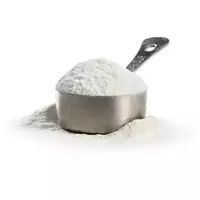Dry whole milk

Milk powder is a powdered food product that is obtained during the drying process of pasteurized and also normalized cow's milk. Such a product as milk powder is quite convenient and easy to use. In order to obtain a drink that in its useful properties will not be inferior to ordinary pasteurized cow's milk, you just need to dilute the milk powder with drinking water. Dry milk is actively used in the food industry, as well as in cooking.
On the basis of powdered milk, mixtures are made that are used in the diet of infants. It is noteworthy that milk powder appeared a long time ago. Researchers came across a note about the first dry milk in a periodical entitled "The Work of the Imperial Free Economic Society, " dated 1792 and issued in St. Petersburg.
As it turned out, the peoples of the eastern regions of the Russian Empire specially frozen milk in order to eventually obtain reserves of the so-called "milky blocks. " Already in 1802, the first milk powder was produced at the Nerchinsky plant, which was not inferior in quality to the usual dairy product. Currently, food manufacturers produce the following main types of milk powder:
skimmed milk powder;
whole milk powder.
It is about the distinctive properties of whole milk powder that will be discussed in the denoted material. First of all, it should be noted that the main feature or property of whole milk powder is the ability to store a product for a longer period of time, which does not change its original distinctive taste and consumer characteristics.
Composition of whole milk powder
The vitamin-mineral composition of whole milk powder is also noteworthy. In the chemical composition of whole milk powder, such undoubtedly useful natural compounds as vitamins of group A, B, C, D, E, as well as H and PP can be found. In addition, the composition of whole milk powder contains choline, manganese, iodine, iron, selenium, calcium, sodium, magnesium, phosphorus, and other substances. It is noteworthy that the calorie level of whole milk powder is at a fairly high level.
The average calorie content of whole milk powder is at 483 kcal, which are contained in 100 grams of powdered food. The benefits of whole milk powder lie in the chemical composition of the product, which contains a large amount of useful, and in addition, essential compounds of natural origin for the human body.
Benefits of whole milk powder
The unique benefit of whole milk powder lies in the content of all 20 essential amino acids in the product, which are necessary for the normal functioning of the human body. However, in addition to the benefits, there is information about the dangers of whole milk powder. The chemical composition of whole milk powder contains a large amount of oxidized cholesterol in comparison with ordinary cow's milk.
Harm to whole milk powder
In addition, do not abuse dry milk to whole people who suffer from lactose deficiency. This disease is characterized by poor digestibility by the human body of all fermented milk foods. Frequent consumption of whole milk powder in this type of disease can lead to complications and dispersion of the gastrointestinal tract.
483 kCal whole milk powder
Energy value of whole milk powder (Ratio of proteins, fats, carbohydrates - ju):
Proteins: 24.2 g (~ 97 kCal)
Fats: 25g (~ 225kCal)
Carbohydrates: 39.3g (~ 157 kCal)
Energy ratio (bj | y): 20% | 47% | 33%
 Español
Español Français
Français Português
Português Русский
Русский 简体中文
简体中文 繁體中文
繁體中文 日本語
日本語 한국어
한국어 العربية
العربية Türkçe
Türkçe Қазақ
Қазақ Deutsch
Deutsch Italiano
Italiano Українська
Українська
